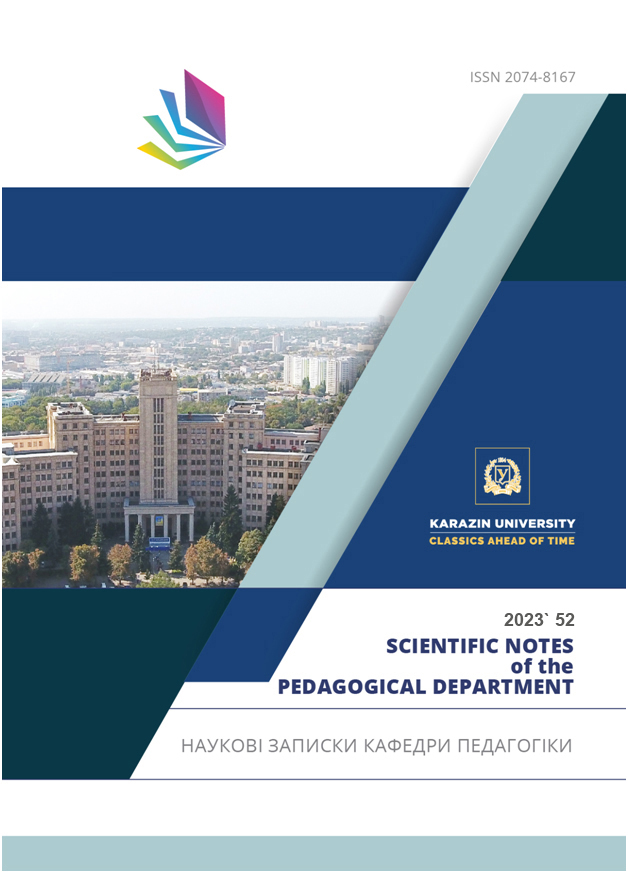Особливості інтелектуального виховання дітей у закладах дошкільної освіти Китайської Народної Республіки
Анотація
Дошкільний вік є сприятливим періодом для формування початкових знань дитини про оточуючий світ, закладання основ для подальшого посиленого інтелектуального навчання. Утім, надзвичайно важливо не перетворити освітній процес у закладах дошкільної освіти у напружене й інтенсивне інтелектуальне виховання, аби уникнути інтелектуального перенавантаження дітей, сприяти рівномірному розвитку мислення, емоцій та волі дитини, забезпечуючи її гармонійний розвиток. З огляду на це доцільним є дослідження специфіки здійснення інтелектуального виховання в різних країнах світу, зокрема КНР, з метою виокремлення позитивних надбань світової освітньої практики щодо інтелектуального виховання і розвитку дітей.
Мета дослідження – розкрити особливості організації інтелектуального виховання дітей у закладах дошкільної освіти Китайської Народної Республіки.
Завантаження
Посилання
Bogush, A., Havrysh, N. (2017). Speech development of children of the fourth year of life: educational methodical
manual Kyiv: Genesis. [in Ukrainian].
Burkovska, O. (2010). Holistic approach to the development and education of the youngest. Preschool education, 6, 10-12. [in Ukrainian].
Vasylieva, S., Gavrish, N., Ragozina, V. (2021). Education of young children in preschool education institutions of different types: monograph /; Ed. by N. V. Gavrish. Kropyvnytskyi: IMEX – LTD [in Ukrainian].
Holovko, M., Mikheieva, O. (2019). Pedagogical support of preschool childhood: teaching. manual Sloviansk: DDPU [in Ukrainian].
Ivanenko,N.,Kozak,L.(2022). Pedagogical support of children of preschool age as a psychological and pedagogical problem. Perspectives and innovations of science. Series “Pedagogy”, Series “Psychology”, Series “Medicine”, 6, 173- 183. Retrieved from https://elibrary.kubg.edu.ua/id/eprint/41741/1/Ivanenko_Kozak.pdf [in Ukrainian].
Krutiy, K. (2010). Conceptual principles of psychological and pedagogical support: principles and techniques. Humanization of the educational process, 1, 185-198. [in Ukrainian].
Polovina, O. (2020). Art education today: a choice of approaches. Preschool education, 12, 3-8. [in Ukrainian].
Kuzmuk, L., et. al. (2013). We develop, teach, raise a child of the third year of life: method. manual / Ed. by T. Ponimanska. Kyiv: Slovo [in Ukrainian].
Savchyn, M. (2011). Age psychology: teaching manual. Kyiv: Akademvydav [in Ukrainian].
Saprykina, O. (2007). Methodology for the development of active speech of children of the third year of life in artistic and subject activities. PhD thesis, Luhansk Taras Shevchenko National Pedagogical University, Luhansk, Ukraine [in Ukrainian].
Smolnikova, G. (2018). Peculiarities of development of mental processes in young children. Teacher’s palette, 3,
-6. [in Ukrainian].
Stetsenko, T. (2020). Experiments in art: implementing STREAM education. Preschool education, 1, 20-23.
[in Ukrainian].
Telcharova, O. (2017). Pedagogy of early childhood: teaching methodical manual. Kharkiv: I. Ivanchenko
[in Ukrainian].
Ionova, O., Luparenko, S. (2022). Speciꢁic Features of Waldorf Preschool Pedagogy. Studies from Early Childhood Education 2022 (pp.60-62) / Ed. by Monika Miňová, Matej Slováček. Presov: OMEP.
孩子的早期教育能力胜于智力 [Children’s early education ability is better than intelligence]. Retrieved from
http://tlshun.com/zaixianketang/200810/13-33_2.html [in Chinese].
EducationalTeaching.教育教学,3,11[LuZhongchun. (2021). On the cultivation of children’s intelligence and good habits in preschool education. Educational Teaching, 3, 11]. Retrieved from https://cn.usp-pl.com/index.php/jyjx/article/viewFile/56081/55948 [in Chinese].
付娅.(2021).自然观察智力及其在幼儿园教育中的培养. 中国教工,4期[Fu Ya. (2021). Natural Observational Intelligence and Its Cultivation in Kindergarten Education. China Teachers, 4]. Retrieved from http://www. chinaqking.com/yc/2021/2973345.html [in Chinese].
曲欣. (2001).早期开发幼儿“复合智力.ChinaEducationandResearchNetwork[QuXin.(2001).Earlydevelopment of children’s “compound intelligence”. China Education and Research Network]. Retrieved from https://www.edu. cn/edu/xue_qian/xue_qian_yan_jiu/zhuan_ti/jia_ting/zhi_li/200603/t20060323_12406.shtml [in Chinese]. 19. 张晓艳. (2017). 幼儿园教育中关于幼儿自然观察智力的培养. 知识文库, 22, 65 [Zhang Xiaoyan. (2017). Cultivation of children’s natural observation intelligence in kindergarten education. Knowledge Library, 22, 65].
张金兰. (2019). 自然观察智力及其在幼儿园教育中的培养. 基础教育论坛, 17, 66-68 [Zhang Jinlan. (2019). Natural observation intelligence and its cultivation in kindergarten education. Basic Education Forum, 17, 66- 68]. [in Chinese].
杨碧君, 吴加奇. (2022). 以“非智力因素”衔接为抓手重构课程. 中国教育新闻网-中国教育报 [Yang Bijun, Wu Jiaqi. (2022). Curriculum reconstruction based on the connection of “non-intellectual factors”. China Education News Network-China Education News]. Retrieved from http://www.jyb.cn/rmtzgjyb/202205/ t20220522_694027.html [in Chinese

